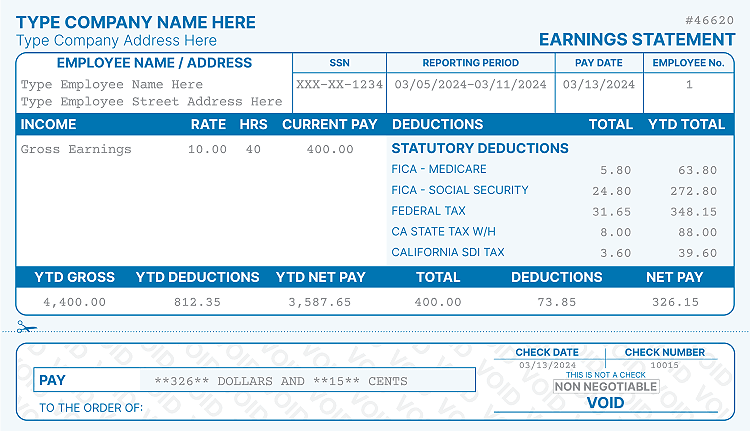What is a PayStub and What Does a Paystub Look Like?
What is a PayStub?
A paystub or paycheck stub is a piece of document an employer gives to their employee or a self-employed individual that outlines the details of how much earnings an individual makes within a pay period or service contract. These slips provide a breakdown of financial statements, including hours worked, wage rate, gross and net income, deductions, taxes, and contributions.
Now that we have determined what a pay stub is, let us answer the other questions surrounding them. But first, read Pay Stub Abbreviations and Acronyms Decoding Tips to help guide you through the terms included in your paystub.
What are PayStubs used for?
Paystubs reflect the gross and net income, taxes, deductions, contributions, and YTD information of a working individual. It serves as a record of their wages, helping them understand their financial statements.
Paystubs provide proof of income for individuals applying for a house loan, car loan, or mortgage. They also help small business owners maintain a record of their expenses and contributions.
Additionally, paystubs are also helpful for when tax season comes around, especially for computing the tax responsibilities of individuals. They could also help resolve any discrepancies with employee wages.
What Does a Paystub Look Like?
Paystubs could have various designs and layouts depending on the look a business owner, employed or self-employed individual desires. Using Real Check Stubs' pay stub templates, you could have various pre-formatted layouts that you could choose.
Read: Business owners guide for paystub templates
Modern Pay Stub Template
The modern paycheck stub template presents a simple design that contains enough information to give an employee an idea of their wage statement. The modern template provides a quick and easy-to-understand overview of an earnings statement.
The first row includes the company and employee name and address, SSN, pay period, pay date, and employee ID. The second row contains the gross income, wage rate, hours worked, current pay, statutory deductions such as FICA Medicare and FICA Social Security, federal tax contributions, and YTD Totals. Meanwhile, the last row shows the YTD gross, YTD deductions, YTD net pay, and an individual's net income.
Classic PayStub Template
The classic paycheck stub template looks like what most companies and businesses use to generate their paystub. It contains the same information as the modern design templates but with a monochromatic and square design. Like the modern template, the classic template displays a simple-to-follow format that most individuals find easy to understand.
Advanced PayStub Template
The advanced design template offers more information than modern and classic templates. It provides more detail, such as overtime, holiday, vacation pay, bonus, and commissions. This template also shows the taxable marital status of an individual.
An advanced template displays the information with two primary columns with the gross and net pay at the very bottom. The first column contains the amounts involved in computing the gross pay. Meanwhile, the second column covers the deductions subtracted from the gross pay, accounting for the net pay.
What Information is Available on a Paystub?
Now that you know what is a paystub, let us now identify what information is available on a pay stub.
Employer and Employee Information
First, all pay stubs should contain crucial identifying information for both the employer and employee, and this also applies to self-employed individuals and freelancers.
Generally, pay stubs contain the employer and employee's name, address, contact information, Social Security number, and other details needed to identify an individual, among others. Ensure that you input all items accurately to avoid any confusion or conflict.
Gross Income
Gross income is one of the most critical numbers in your pay stub. Gross income refers to the payment an employer or customer owes you for a period of work or service provided. Gross earnings are the value before taking out any mandatory deductions, and this should also include overtime pay if any.
Gross income comes in two items: the pay period's gross wage and the YTD (year-to-date) total. It could also include additional pay an individual may earn, such as bonuses and sick pay, among others.
Taxes, Deductions, and Contributions
An individual's earning statement should also contain details on mandatory state and federal taxes, deductions, and contributions. These amounts reduce the total take-home pay of an employee or self-employed individual.
Back Pay
Also known as dated pay, back pay includes the amount an employer owes their employee carried over from the previous pay period. If any, back pay could also include reimbursable payments due.
Net Income
After subtracting all applicable deductions, taxes, and contributions, you would arrive at what you call net income or take-home pay. An individual takes this amount home entirely without worrying about any deduction.
Read: What is gross pay and what is net pay
Automate the Paystub Process Creation
Using outdated systems such as manually writing pay stubs or using excel sheets could become tedious quickly. Additionally, it does not make sense anymore, especially in the fast-paced business world. It would consume a lot of time that you could otherwise use for more important tasks.
Automate the process of generating your pay stubs using Real Check Stubs, and you will thank yourself later. Real Check Stubs’ pay stub generator allows you to fast-track repetitive administrative tasks with multiple design templates and automatic calculations.
Create professionally made proof of income and earnings statements without worrying about mistakes that could cause trouble. It only needs three steps using the online salary slip maker to achieve an efficient and effective method of generating your pay stubs. You would only need to understand the basics of what is a pay stub, and you are ready to go.
Read: How to make a paystub

